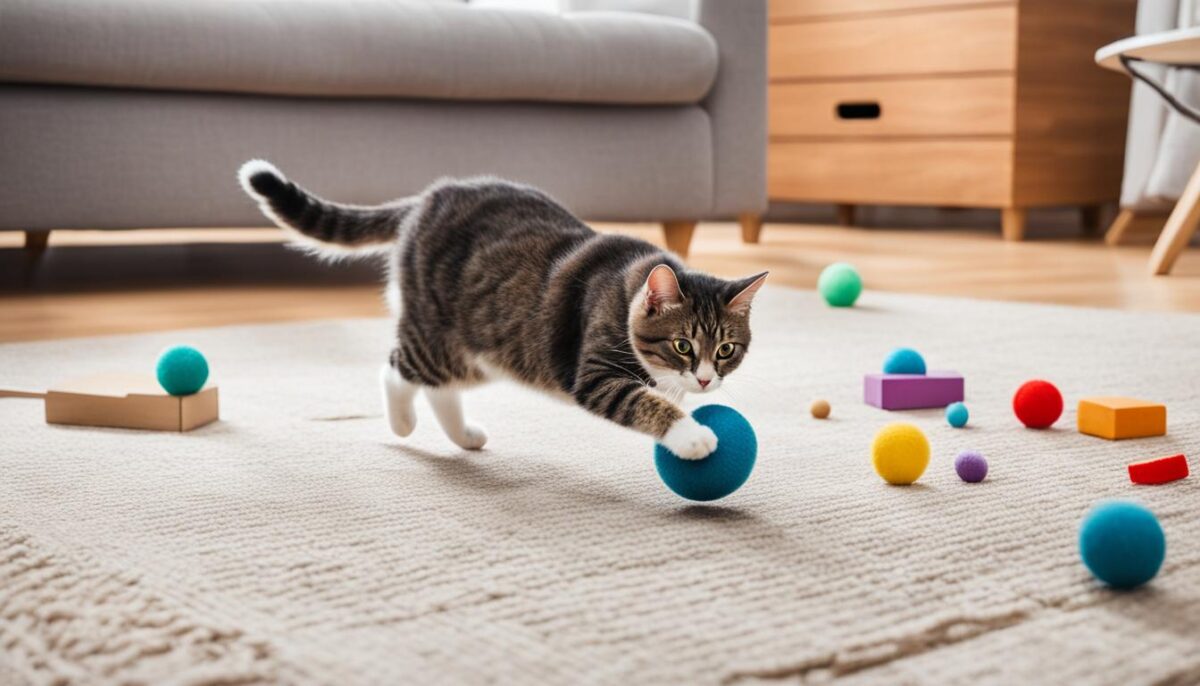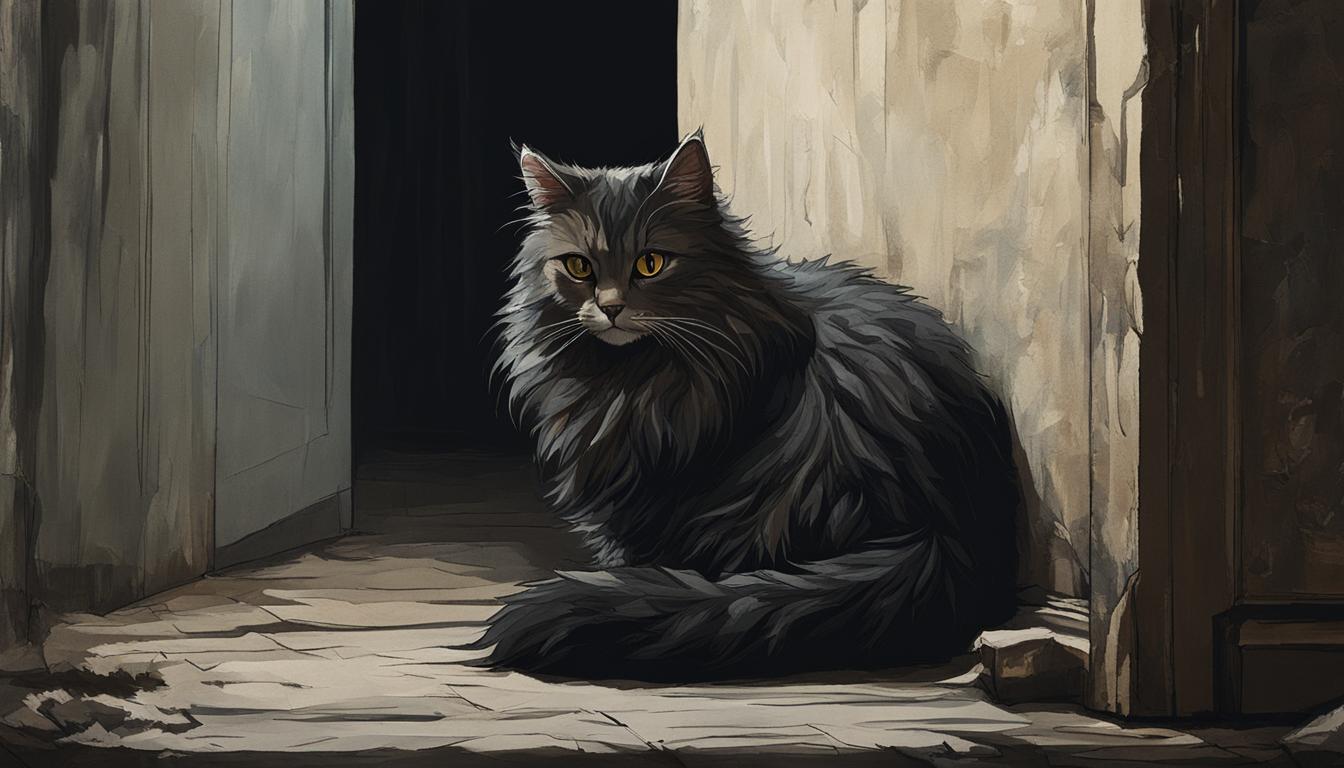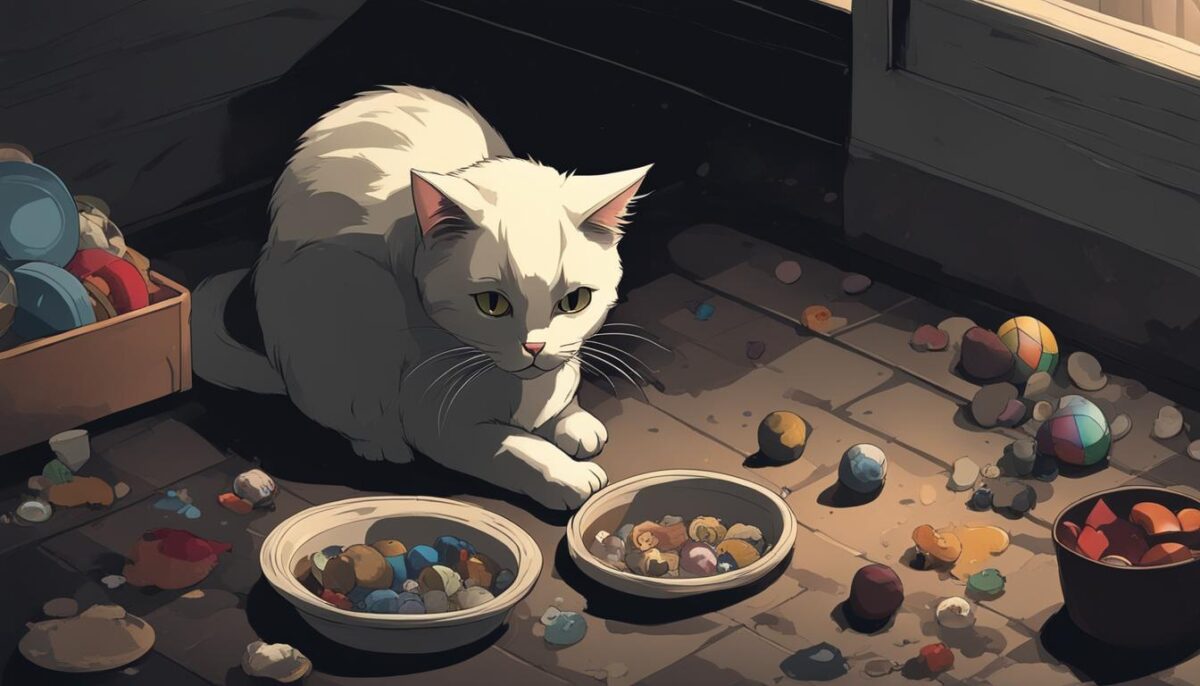Did you know that cats can feel sad, just like you and me? Sometimes, things happen that can make a cat’s mood go down. They might not want to play or hang out like they used to. This could be a sign of feline depression. When cats are not happy, they might eat less and not groom themselves. It’s like they lose interest in looking nice and eating tasty food. If you spot your kitty being less active or acting different, it’s a good idea to see the vet. We should make sure they are healthy and happy.
Key Takeaways
- Cats can feel down and show signs of cat sadness.
- Changes in how they play and their usual habits might mean they are not happy.
- Keep an eye on your cat’s emotional health, especially after big changes.
- Depressed cats signs include less grooming and a change in how much they eat.
- If you think your cat feels sad, a vet check-up can help.
Recognizing the Signs of Feline Depression
Have you noticed changes in your furry friend’s behavior? Cats can get sad too, and sometimes these feelings show up in different ways. It’s important to spot the signs of cat depression so you can help your kitty feel better. Let’s learn how to spot these signs together.
Changes in Behavior and Playfulness
When cats feel down, they may not want to play. Maybe your cat doesn’t chase their favorite ball or isn’t interested in their catnip mouse anymore. Feline behavior changes like these can be a clue that your cat is not their happy self.
Shifts in Appetite and Eating Patterns
Sometimes a sad cat will eat less, and sometimes they will eat more. These appetite shifts in cats might be easy to see. If your cat leaves food in their bowl or begs for more snacks than usual, these could be signs that something’s up.
Physical Indicators: Grooming and Weight Changes
Cats like to stay clean. If your cat stops grooming or starts to look messy, it might mean they’re sad. And sometimes, they might even groom too much! Also, if your cat gains or loses weight, it’s a sign to pay closer attention.
Emotional Outbursts: Increased Vocalization
Your normally quiet cat making more noise can be a surprise. Sad cats might meow more or make different sounds. Cat vocalization changes like this are worth noting. Remember, if you see your cat acting differently, a trip to the vet is a good idea. They can make sure your kitty is healthy and help them feel happy again.
Understanding Why Cats Experience Sadness
Do you know that sometimes cats can feel sad, just like you and me? If their world changes or if something hurts, they may not be as happy as they usually are. Let’s find out why our furry friends may get the blues.
The Impact of Environmental Changes
Cats really like it when things stay the same every day. When stuff changes, like moving to a new home or when people come and go at different times, it can be tough for them. These changes can cause feline environmental stress, making them feel upset or scared. It’s kind of like when you go to a new school and miss your old friends and teachers.
Grieving the Loss of a Companion
Cats can feel pet loss grief too. If they had a cat buddy or maybe a dog friend that isn’t around anymore, they might miss them a lot and feel lonely. They could walk around calling for their friend or look for them in their favorite spots. It shows us that cats have big hearts and form special bonds with their buddies.
Medical Conditions and Emotional Health
Sometimes cats feel sick or in pain, and that can make them seem sad or not like their usual self. Just like you may feel grumpy if you have a tummy ache, cats can get moody when they don’t feel good. If we keep an eye on cat health and mood, we can catch these issues early, and help our cats feel better sooner!
If you see that your cat is not acting like they usually do, remember there could be reasons like these that are causing them to feel down. Being patient and gentle with them, and showing lots of love, can help your cat feel better during these tough times.
Understanding Feline Depression and Mood Changes
Hey there, have you ever wondered if your furry friend can get the blues? Well, understanding feline depression is key to helping them. Cats, just like us, can feel down sometimes. This is especially true when big changes happen in their lives. Indoor cats might show this more because we’re around to see the changes in their indoor cat mood. But, remember, outdoor cats can feel sad too!
Signs that your cat might not be feeling their best include not wanting to play or explore as much. Big shifts in their world can have a big impact. Just think about how you feel when something big changes—it can be pretty tough, right? It’s the same for your cat. This is all about the effects of changes on cat mood. If you see them feeling down, it’s important to help them feel better.
It’s pretty cool to learn how much our cats’ feelings are like ours. We can help our pets have good cat mental wellness by keeping an eye on them and being there for them. Just a little bit of extra love and care can make a huge difference to your little buddy. Let’s make sure our cats are happy and healthy!
Practical Ways to Support Your Cat’s Mental Well-being
Your cat means the world to you, and just like us, they need love and happiness to stay healthy in their minds. When your furry buddy feels blue, you can do some really simple things to cheer them up. Imagine how you feel when someone gives you a hug or plays a game with you—that’s what your cat needs too!
Providing Comfort and a Stress-Free Environment
Imagine a place where you can snuggle up and feel safe—cats need this kind of spot too. Creating a stress-free home for cats means cozy beds, quiet spaces, and lots of love. Try giving them soft blankets or a window to look out of. This can make a big difference in feline mental health.
Interactive Play and Stimulation
Playing is not just fun, it’s a big part of keeping your cat’s mind sharp. With interactive cat play, you can use cool toys that make them jump, pounce, and chase. Here’s a tip: play with them every day, even if it’s just for a little bit. This helps them feel loved and keeps boredom away.

Strengthening Your Bond Through Quality Time
Just being with your cat can make them feel special. Bonding with your cat might mean sitting together quietly, talking to them, or gently petting them. When you spend quality time together, they feel more relaxed and happy, and that’s a big win for their well-being!
And remember, your cat has feelings too, so keep things steady and calm around them. They don’t like too many changes all at once. Try these tips, and you’ll see your cat flip from sad to glad, purring more every day!
Catering to Your Cat’s Emotional Needs Through Diet and Routine
Did you know what your cat eats can make them happy or sad? Just like how you feel good when you eat your favorite foods, cats feel the same way too. A cat diet for emotional health is very important. It’s all about giving them the right food that’s yummy and good for their body.
Keeping the same times for meals and play can also help. When things happen like they usually do every day, it makes your kitty feel cozy and safe. This is called maintaining a cat routine. It’s like when you know you have lunch at noon and playtime at the park after school; it helps you feel good because you know what’s coming up.
Let’s not forget nutrition and feline well-being. The kind of food a cat eats is super important to help them feel their best, inside and out. Foods with lots of vitamins and good stuff help keep your cat’s fur shiny and their eyes bright. Plus, it makes their heart healthy and strong.
So, how about we make a plan to keep your cat bouncing and purring? It’s easy!
- Choose foods that are full of healthy things for cats.
- Stick to feeding them at the same times each day.
- Make time to play with them after meals or whenever they’re most active.
By following these simple steps, you’ll be helping your furry friend feel the best they can be. Now, give your kitty a hug and get started on that happy cat routine!
Professional Resources and When to Seek Help
If your kitty seems sad all the time, you may want to get some help. A vet can check if your cat has a health problem and figure out ways to make them feel better. They might tell you about fun stuff to do with your cat, like special games or listening to calming music. And they can share tips about yummy foods for cats that are safe and healthy. Let’s find out more about what a vet can do and other cool things to try for your cat’s mood!
Benefits of Consulting with a Veterinarian
Visiting a vet is a good choice if your cat doesn’t cheer up. The vet can talk to you about cat depression and figure out the best plan. They may even use games and music to help your cat feel happier. Do you know that a quick check-up can really help your cat?
Understanding and Utilizing Behavioral Therapy
Did you hear about feline behavioral therapy? It’s like a special class for your cat to learn good habits and feel better. A vet or an animal expert can give you advice on this. They can make learning fun for your kitty, so they won’t be sad anymore.
Natural Supplements and Holistic Approaches
There are also natural ways to help your cat’s mood. Things like certain plants or soft, peaceful music can make a big difference. These natural remedies are gentle and can really help your cat feel cozy and safe. Isn’t that great?
Conclusion
Cats are a bit like us. They can feel really sad and may not want to play like they used to. It’s good to watch for signs that they are not their happy selves. Look out for times when they eat too little or too much, or don’t want to cuddle. These can be hints that your furry pal needs extra love.
To help make your cat feel better, try to keep them happy with fun toys and lots of snuggles. Spend time with them and give them a soft bed to sleep in. It’s all part of caring for them. Improving feline happiness is not just about games and treats, it’s about feeling safe and loved.
If you’re not sure and still worried about your cat being sad, it’s okay to ask for help. Your vet can check on your pet and tell if your cat needs more care. Managing cat depression is important for keeping them cheerful. Always remember that making our kitty friends feel their best is a big part of loving them.
FAQ
Can cats experience depression like humans do?
Absolutely, cats can exhibit signs of depression similar to humans, including a lack of interest in activities they once enjoyed, changes in sleep patterns, and even altered eating habits.
What are some common signs of depression in cats?
Signs of cat depression can include noticeable shifts in behavior such as decreased playfulness, variations in appetite, changes in grooming habits, weight changes, and increased vocalization, which may indicate emotional distress.
What factors can contribute to a cat feeling sad or depressed?
Several factors can impact feline emotional health, including environmental changes, the loss of a familiar companion, and underlying medical conditions that affect their overall mood and behavior.
How can I tell if my indoor cat is suffering from depression?
With indoor cats, changes such as a diminished interest in exploring or engaging with stimuli can be a signal of feline depression. It’s important to note shifts in their regular behavior and consult a vet if necessary.
What can I do at home to help my cat’s mental well-being?
You can support your cat’s mental well-being by providing a comfortable and stress-free environment, encouraging interactive play, and spending quality time to strengthen your bond with your furry friend.
How does diet affect my cat’s mood and emotional health?
A well-balanced diet is crucial for your cat’s emotional health. Ensuring your cat receives proper nutrition and maintaining a consistent feeding and play routine can positively influence their mood and well-being.
When should I consider seeking professional help for my cat’s sadness?
If changes at home do not improve your cat’s mood, or if you notice persistent signs of depression, it’s important to consult with a veterinarian. They can determine if there’s a health issue that needs to be addressed or if behavioral therapy or other treatments might be beneficial.
Are there natural remedies or holistic approaches to improve my cat’s mood?
Yes, alongside professional medical advice, some natural remedies and holistic approaches, including certain plants, soothing music, and specific safe human foods might help boost your cat’s mood. However, always check with your vet before introducing any new elements into your cat’s environment.

